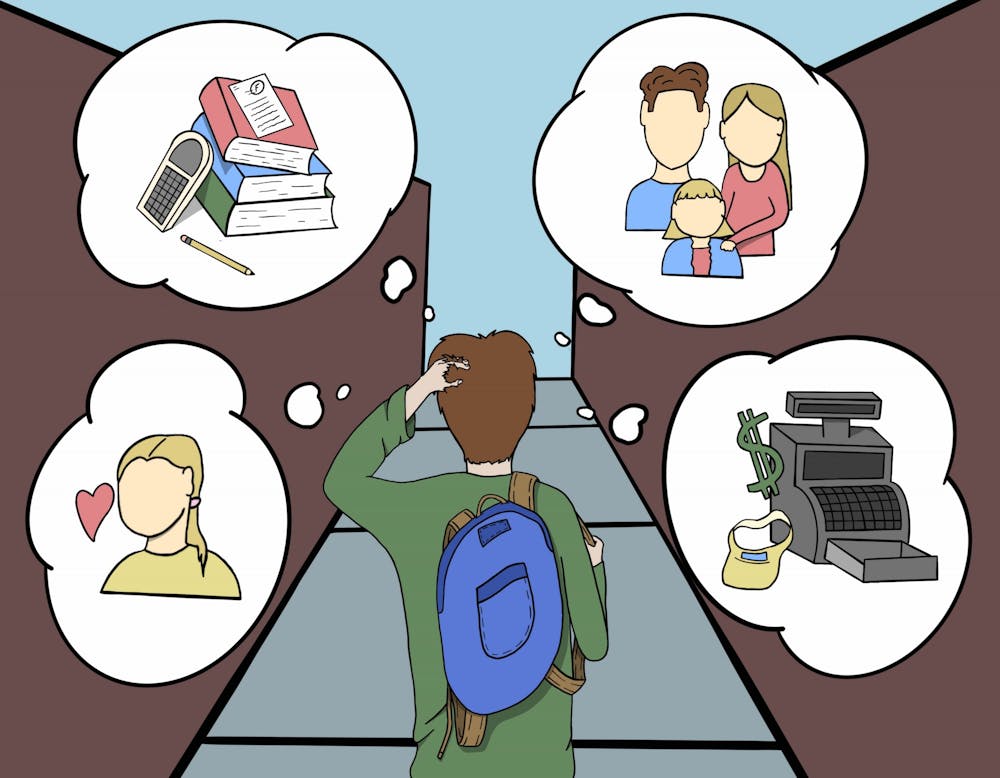Transitioning to college is an extremely anxiety-inducing experience. Under normal circumstances, students have to adjust to living alone, meeting new people and navigating their way around an entirely new environment.
This past year has caused college students additional stress with the anxiety of the global pandemic. Students have had to worry about catching a potentially deadly disease, how to navigate a new platform for online learning and how to interact socially while remaining distant from other people.
While the pandemic has, in many ways, slowed life down and created countless obstacles and challenges, it has also facilitated the development of a necessary resource that breaks down barriers to mental health treatment — the wide scale implementation of online counseling. This resource particularly helps college students, many of whom are scattered across the globe away from their typical college living arrangements and don't have easy access to in-person services.
This transition was triggered largely by the pandemic, but its expansion shouldn't end with the pandemic as we know it.
According to the Anxiety and Depression Association of America, anxiety disorders are now the most common mental illness in the U.S., affecting 40 million adults every year. Although treatment options have increased through time, only 36.9% of people suffering from anxiety receive treatment.
In a survey by the ADAA, 30% of students reported that stress had negatively affected their academic performance, and 85% reported that they'd felt overwhelmed by everything they had to do at some point in the past year.
Although the global pandemic has created more stress and anxiety, it also opened new opportunities to increase awareness for this prevalent mental health issue.
A study published in the Journal of Pastoral Care and Counseling, which explored both spiritual counseling services and general psychology and counseling, explained that the pandemic has created a new need for increased online mental health services. The study found that online counseling is more convenient for people, and clients who take part in cyber counseling are less likely to feel ashamed about their issues due to the less intimidating nature of virtual services.
Aaron Krasnow, associate vice president of ASU Health Services and ASU Counseling Services, specializes in anxiety and mental health promotion. Krasnow said virtual counseling tends to resonate more with most students, especially during the pandemic.
“Distance health works better for some people because a large amount of people struggle with time management for mental health support. Now students can log on whenever, meaning that seeking help is easier for them and they feel they can fit it into their schedule,” Krasnow said.
A large component of anxiety and other mental health issues is that they can only be resolved if individuals have the mindset for change, Krasnow said. He said transitioning to online counseling can be a difficult adjustment from the standard in-person counseling, but the benefits outweigh the difficulties.
“One thing about online counseling is that you have to get into a different mindset. Just like online classes, you have to be held accountable to attend the online counseling sessions," Krasnow said. "What you put into it is what you get out of it, but online increases your access in many ways.”
ASU Counseling Services recently expanded its online outreach by launching Open Call and Open Chat, which provides all ASU students with the opportunity to talk to a counselor at any given time or location.
Krasnow, one of the main contributors to the platform, said this doesn’t replace the counseling center at ASU but is an expansion of access to therapists across the world.
“With the pandemic, a lot of students couldn’t return to campus but still deserve access to the counseling services that ASU offers," Krasnow said. "Sometimes students don’t want therapy, but just want someone to talk to and this is their opportunity. You can now schedule a telehealth appointment in over 60 languages, giving all ASU students the opportunity to get counseling."
Mental health is highly important and cannot be brushed aside in college students who have to deal with large amounts of stress on a daily basis. Online counseling has introduced a wave of new opportunities for students to receive the help they need without the restraints of time or location. Students can now seek help on their own terms, thereby normalizing acknowledgement and treatment of mental illness — a process that should continue into the future.
Reach the columnist at atretsch@asu.edu or follow @alexistretschok on Twitter.
Editor’s note: The opinions presented in this column are the author’s and do not imply any endorsement from The State Press or its editors.
Want to join the conversation? Send an email to opiniondesk.statepress@gmail.com. Keep letters under 500 words and be sure to include your university affiliation. Anonymity will not be granted.
Like The State Press on Facebook and follow @statepress on Twitter.
Continue supporting student journalism and donate to The State Press today.




